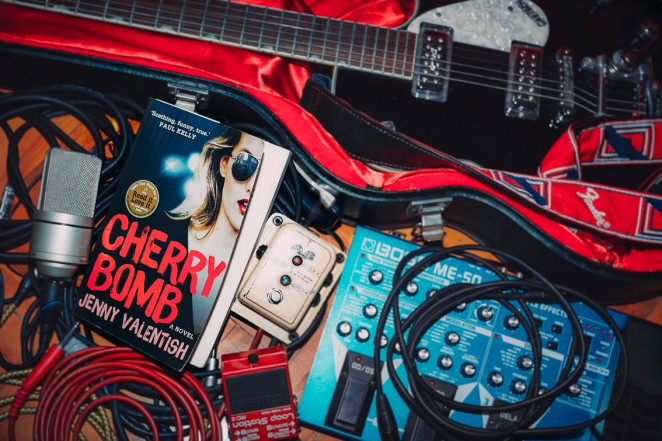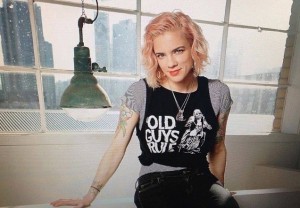 Set in the Australian music scene, Cherry Bomb is the debut novel from magazine/web editor, blogger, musician and pop culture maven Jenny Valentish. AM’s Greg Phillips sat down with Jenny to discuss the book’s origins. Pic above by Robert Seba
Set in the Australian music scene, Cherry Bomb is the debut novel from magazine/web editor, blogger, musician and pop culture maven Jenny Valentish. AM’s Greg Phillips sat down with Jenny to discuss the book’s origins. Pic above by Robert Seba

“I’d love Cherry Bomb to be in every toilet in Australia in much the same way as Valley of the Dolls or something. It’s that kind of book, you can tear through it like a packet of Cheezels,” chuckles author Jenny Valentish about her debut novel. It’s a fun, rollicking ride through the ups and downs of a fictional band called The Dolls, a duo consisting of cousins Nina and Rose Dall. Whether you’re in a band, have worked for a music PR or record company, or your life has been somehow connected to the Australian music industry, you will feel like you know a character from this book. However, most of the key players are not so much based on one particular person but a blend of many. Nina and Rose are a pastiche of anyone from The Veronicas to The Runaways and Courtney Love. Inside their world, you’ll find their mentor aunt Allanah Dall, who ruled the airwaves herself decades prior and has the persona of a Chrissy Amphlett , Debbie Harry or Madonna. There’s the Michael Gudinski-style record company mogul John Villiers, and numerous other execs, publicists, producers, roadies and bandmates you would be familiar with.
The music world Valentish paints through the eyes of Nina and Rose is not an attractive one but she’s keen to stress that Cherry Bomb is a fictional work, full of industry stereotypes. “They are just a couple of selfish individuals for the sake of the plot,” Jenny explains. “Nina has a massive chip on her shoulder because she thinks her life is harder than anyone else’s and her cousin Rose is more of that stereotypical narcissist of Gen Y, where it’s all about ‘likes’ on Instagram. Yet, on the other hand Jenny does admit that she borrowed more from real life for some characters than others. “I feel like I have got away with murder actually,” she exclaims. “There was one person who very much knew they were a character in the book. They knew in advance and I had to send them a copy. They were really gracious about it.”
To local music industry folk, there are aspects of Cherry Bomb which will have you cringing, laughing and nodding enthusiastically at the familiarity of situations. Jenny Valentish is more qualified than most to present such a colourful portrayal of the entertainment world. As a teenager in England, Jenny performed and recorded with bands and learned the hard way that success is only attainable for a fortunate few. She instead found another avenue into the business, quickly rising through the ranks of music journalism at respected UK musician publication Guitar and Bass. On arrival in Australia, she was snapped up by Triple J to edit their publication JMag and is currently editor of Time Out Melbourne. Valentish has also contributed to Australian Musician. So how much of real-life Jenny Valentish makes it into her own novel?
“Quite a lot'” she states. “More than I had intended. I was quite a hectic teenager so I did think back to myself at 17 and very surgically stripped off some personality traits. I was quite introspective and depressive, so I thought that would be really boring to read about. I thought if I just got rid of those aspects and leave someone quite rash and bull-headed, that way I kind of have the protagonist in a room with me. I could say, OK, what would you do? You’ve just signed a deal, what are you going to say to the record company mongrel? I just know the answer.”
Valentish drew a lot from her time in bands, particularly one called Spy 51, including her stage experiences, lyrics from songs she had written, the dealings with record companies and the studio time with a well known producer. “A lot of the experiences were real,” she reflects. “We never played a shopping centre though,” as Cherry Bomb’s main characters did. “We did have a manager called Ian Essence (also portrayed in the book), because all he ever said was ‘in essence’. I can’t even remember his real name. Also things like playing gigs with the pedals all plugged in the wrong way and nothing happening. So all the earlier experiences in the book before they get signed by Grandiose (mythical record company) were real. We recorded with a producer who gave me the idea for John Villiers. He was a huge producer in England who had worked with post-punk bands like The Cure and Nenah Cherry. We only had one day in the studio with him but I remember thinking about the power dynamic. He was a lot older. Our other guitarist was standing by his shoulder the whole time offering him advice. Whereas me and the other girl in the band were kind of … oh god, we are going to be exposed as frauds. I found it interesting that he possible held the success of our band in his hands, even though it was just a single.”
While playing in bands in the UK, Jenny was wide-eyed and innocent about much of how the music industry worked. As a teen on stage, it was more about the visual impact of her gear as opposed to the sound it was producing. Although in retrospect, the brands she used didn’t seem too shabby at all. “I had a Duesenberg,” she recalls. “A bit later I had a Peavey semi-acoustic. My main guitar was a blue sparkly thing with a massive whammy bar. I was so proud of it but before I started working for the guitar magazine, I barely knew my whammy bar from my headstock, so the main interest was that it was blue and sparkly. Our main guitarist had everything, the mothership. I had really old Boss pedals, basic distortion. I loved to have reverb and echo. I was really into the surf sound. The guitarist just wanted to make the guitar sound like anything other than guitar. I was also in a surf band and we wore hula skirts. I played a Fender bass in it.”
At Cherry Bomb’s core lies the usual suspects you’ll find in a good old fictional romp, such as lust, greed, revenge, betrayal, etc but it also inadvertently sheds light on some long-debated observations about female musicians in the industry. In fact, there is a paragraph in the book, in which Jenny admits that its origins lie in a piece she wrote for Australian Musician’s Ms Musician edition. That was a special issue of Australian Musician, guest edited by Clare Bowditch in which all of the articles were about female artists and penned by female writers. In Jenny’s piece, she was discussing why it was that there was such a small percentage of female lead guitarists in bands. In essence (sic), Jenny was controversially suggesting that boys who played air guitar histrionically in their bedrooms were more likely to go on to become lead guitarists, while women were more likely to either give up or become bass players.
“I think men in general have more self-belief than women,” she explains. “When you’re at that stage of bedroom bands, women hear themselves and think, this is terrible … I’m sorry and stop. Whereas, thinking back to my own experiences, men would randomly spasm their fingers all over the frets and play with loads of distortion and play as loud as possible. Eventually, because they persevered and a lot of women didn’t, they’d get as good at it as they thought they were. You get someone like Abbe May who plays guitar behind her head and machine guns everyone, but it’s really rare. You don’t see many but the ones you do see tend to be in your face show-offs.”
One of the other issues that presents itself in Cherry Bomb is that of artist manipulation by those who stand to reap rewards from your talent. Although Jenny is not so sure that this is a problem unique to female artists.
“I don’t think it is true of women more than men actually,” she states. “But in the book, I focus more on them turning the tables and manipulating men. If a record company was going to mould an act, I think they would do that regardless of the sex. There is definitely the issue of quotas when it comes to women. When I was editing a music magazine we’d often lament in our editorial meetings that the latest issue was a cock forest – no women in it at all. We’d be scrambling around trying to find someone to include, to show that we had that base covered. The flipside of that is that often a label will tell a female artist that they’ve already got a female singer-songwriter, or already have a Lily Allen, or already have a Grimes, and so there’s no room for another. I’ve read interviews with Joan Jett and Kate Ceberano where they’ve complained of that experience, and I used it as a scene in Cherry Bomb because I believe it to still be true. There’s also a fictionalised review of the band in the book, in which the girls are compared to a succession of female artists and their aunt bemoans that she was always getting compared to Bonnie Tyler. And The Dolls find that they’re often interviewed by female journalists who expect them to give fully formed opinions on third-wave feminism – to step up to the plate for womankind. By contrast, male journalists often write “hatefuck” reviews – a weird mix of lust and fear, which I witnessed a lot in the British inkies as a teenager when riot grrrl was big. Maybe that’s all more of a “woman’s lot” than being manipulated.”
Jenny is pleasantly surprised by the reaction so far to her novel, particularly from artists such as Paul Kelly, Tim Rogers, Abbe May and Adalita who instantly agreed to provide quotes for promotional use. The writing and research for Cherry Bomb was also an enjoyable experience for the debut novelist. While drawing on much of her own experiences in the music industry, she did have to bring herself up to speed with modern day fan behaviour, which necessitated a lot of artist internet stalking, “just to see what fans are like now,” she explains. “There’s a lot in the book about Twitter reactions and the very narcissistic fans you get now who think it’s all about them. I wouldn’t have known all of that if I was drawing on my own experiences. So I’d look at current pop stars and see what kind of updates they’d post and the responses they get. It is crazy what they have to deal with.”
 Valentish has already begun work on her second novel, a psychological thriller but has left the door open for a return to the characters Nina and Rose Dall. However, at the moment that seems unlikely. “When I was writing it, I left the door open for it but I have really gone off on a completely different tangent now,’ she says of the possibility.
Valentish has already begun work on her second novel, a psychological thriller but has left the door open for a return to the characters Nina and Rose Dall. However, at the moment that seems unlikely. “When I was writing it, I left the door open for it but I have really gone off on a completely different tangent now,’ she says of the possibility.
Cherry Bomb is available now through Allen and Unwin. You can also access a soundtrack which was compiled for the book via Spotify.


